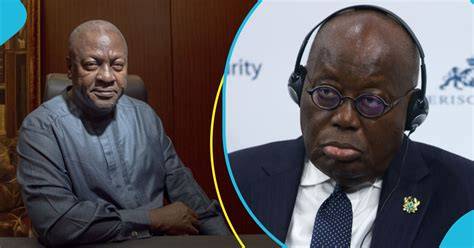Former President John Dramani Mahama's recent remarks on President Akufo-Addo's administration represent a continuation of his broader critique of the current government's performance. As the leader of the opposition National Democratic Congress (NDC), Mahama has consistently accused the Akufo-Addo administration of economic mismanagement and failing to fulfill key campaign promises. However, what stands out about his recent statements is the moral framework within which he has framed his criticism, highlighting what he perceives as the ethical implications of governance failures and a lack of honesty on the part of the president.
Mahama’s critique points to the ethical responsibilities of leaders, particularly the importance of truthfulness and accountability in governance. He argues that the failures of the Akufo-Addo administration are not merely technical but moral lapses that have exacerbated the economic challenges facing Ghanaians. By presenting his criticisms in this light, Mahama seeks to resonate with a population that has borne the brunt of rising inflation, currency depreciation, and the high cost of living. He aims to tap into public frustration and position the NDC as the party capable of restoring trust and delivering on its promises.
The remarks also reflect the heightened stakes of the 2024 general elections. As Ghana moves closer to the polls, the intensity of political competition has significantly increased, with both the ruling New Patriotic Party (NPP) and the NDC pulling out all stops to secure voter support. Mahama’s moral critique is part of a larger strategy to differentiate the NDC from the NPP by portraying the latter as having betrayed public trust. This approach could solidify his base, as many of his supporters share his sentiments about the current government’s performance.
However, this strategy is not without risks. While Mahama’s comments may energize his core supporters, they could alienate swing voters who prefer a more conciliatory and issue-focused campaign. These voters, who are often critical in deciding the outcome of elections, may view the moral framing as overly accusatory or divisive, particularly if they are looking for solutions rather than blame. Additionally, the NPP is likely to respond by defending its record and questioning Mahama’s credibility, which could shift the narrative away from substantive policy debates.
The coming weeks will reveal how Mahama’s statements impact public sentiment and the broader electoral landscape. His ability to maintain a balance between critiquing the current administration and presenting a compelling alternative vision for Ghana’s future will be crucial. For many voters, the election is not only a referendum on Akufo-Addo’s leadership but also on Mahama’s capacity to lead again.
As the electoral contest unfolds, the focus on moral leadership and governance may become a defining theme, shaping the tone and direction of political discourse. Whether this approach helps Mahama gain an edge or backfires by polarizing the electorate remains to be seen. Ultimately, the outcome will depend on how effectively he and the NDC address the concerns of Ghanaians while navigating the complexities of a highly charged political environment.



